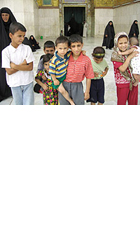
Generation X-Saddam 2003
Distributed by First Run/Icarus Films, 32 Court St., 21st Floor, Brooklyn, NY 11201; 800-876-1710
Produced by Bishari Films Production, Inc.
Directed by Shelley Saywell
VHS, color, 45 min.
College - Adult
Middle Eastern Studies, Multicultural Studies, History
Date Entered: 02/11/2004
Reviewed by Michael J. Coffta, Business Librarian, Bloomsburg University of PennsylvaniaIn the weeks preceding the March 2003 US invasion, filmmaker Shelley Saywell performed a high-risk venture into Iraq to interview young Iraqis regarding the pending US incursion. Shortly after the invasion, Saywell returned to Iraq to find these same young Iraqis to get their assessment of life after the removal of Saddam Hussein and his regime.
In the first interviews, several of the Iraqis interviewed expressed violent anti-American sentiments. In the second interview, they all stated that the Hussein regime would have imprisoned and/or tortured them had they not made anti-American statements. On the other hand, these Iraqis, while pleased that the tyranny of Hussein is over, were disgusted by the chaos in the wake of the invasion. During this disorder, Iraqis have violently settled old scores among one another. Theft, murder and rape are everywhere. The younger generation in particular sees the US as hypocrites for having supported the tyrant Saddam Hussein in his war against Iran, and later attacking their country to dislodge him.
As a form of contrast, several older Iraqis, who were generally pro-US, were interviewed. One Iraqi scientist explained how he was tortured for refusing to work on a nuclear bomb project.
This film is highly recommended for its courageous journey into the mind of the young generation of Iraq. The film demonstrates the feelings of the Iraqi people who dealt with mass killings under Hussein and now live under US-imposed curfews and checkpoints. The film demonstrates that the Iraqis have always been fighting with and dealing with negative presences, and argues that the next generation have no vision left in this continuous vacuum. The Iraqis try to deal with this chaos and frustration while others control their fate.